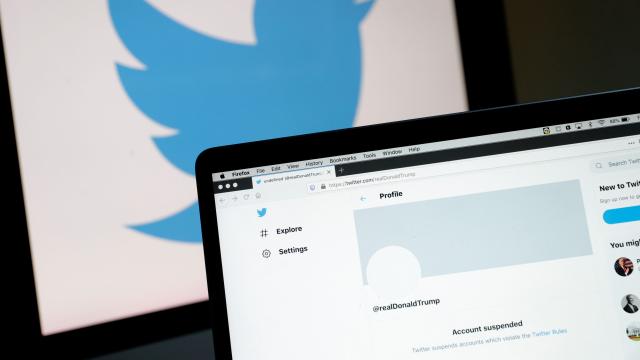Twitter finally banned its worst user last Friday, Donald Trump, after he directly incited a ragtag mob of his most rage-addled supporters into an ill-fated Pickett’s Charge on the Capitol last week.
For years, the site had let the president act with near-total impunity on the site as he spread conspiracy theories, threatened opponents, lied about the novel coronavirus, and pushed violent propaganda. Through all this, Twitter resisted mounting pressure to ban him for what was at least in part paralyzing fear of some kind of backlash. With push coming to shove after the Capitol incident, which resulted in at least five deaths, we now know what said backlash looks like and it’s… sort of whatever?
Per Business Insider, as of mid-Monday afternoon stock in the company has plunged by over 12%, wiping about five billion from its market cap. As of around 3:30 p.m. ET it stood at $US47.90 ($62), down from $US51.48 ($67) at close on Friday.
For those keeping track, Twitter’s stock stood at $US16.58 ($22) on Jan. 20, 2017, the day Trump took office, and even after Monday’s plunge, the company is about 47 per cent more valuable than it was a year ago. To put it another way, this is a bad day for Twitter stock, but it seems more an issue of investor skittishness rather than an all-out implosion.
It remains to be seen what this indicates for Twitter long-term. Trump’s ban and crackdowns on his cohorts has resulted in the usual surge of traffic to alternate right-wing internet hellholes like “free speech” site Parler and neo-Nazi hub Gab. Parler, however, is unlikely to benefit at Twitter’s expense because it was quickly kneecapped. It’s been banned from Google’s and Apple’s app stores and cloud host Amazon Web Services (and even had it not been, all evidence points to it being a fad). For all the talk of a conservative exodus that could harm social media firms’ bottom lines, most of the right-wing media ecosystem has stayed put on sites like Facebook and Twitter.
Facebook separately slid nearly seven per cent on Monday, with its stock down to around $US47.97 ($62) at 3:30 p.m. ET from $US51.48 ($67) at close on Friday. That fluctuation brings it down to what it as worth about a month ago. Other firms that have banned the president have, at worst, been barely affected. E-commerce firm Shopify took a teensy 1.77 per cent dip after removing Trump’s campaign store. Snapchat was up on Monday. Other companies that took action against Trump or his supporters, like Twitch and Discord, aren’t publicly traded and thus insulated against the backlash. YouTube stands alone as the only major platform that hasn’t penalised the president; there’s no indication its parent company Alphabet or Apple have taken any hit related to the Parler ban.
Mark Shmulik, an internet analyst for global asset management firm Bernstein, told Barron’s that he expects the current fracas could result in renewed pressure to tighten regulation like the Section 230 of the Communications Decency Act, the law that shields websites from lawsuits over user-generated content or their moderation choices. But he also added that won’t solve the core issue of content moderation disputes and that the companies themselves aren’t allergic to industry-friendly legislation.
Shmulik added that removing Trump may actually be good news for Twitter’s bottom line: “A Trump ban could offer an incremental ad revenue catalyst. ‘Trump’ is the second-most blocked keyword by advertisers behind ‘Coronavirus’… Remove ‘Trump’ and there’s more brand-safe inventory to go around.”
Trump has reportedly been mulling responding to his bans on Facebook and Twitter by issuing another executive order undermining Section 230. But the president is effectively powerless on that front at this point, as his prior efforts to punish tech firms via executive orders on Section 230 have been pathetically incompetent (and unlikely to survive court challenges.) Any remaining authority he could invoke could be easily reversed by inbound president-elect Joe Biden.
